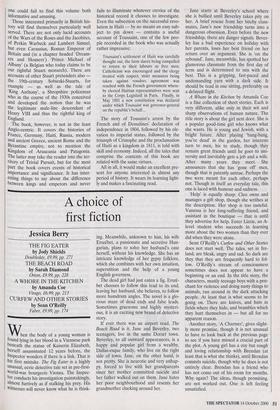A choice of first fiction
Jessica Berry
■ hen the body of a young woman is found lying in her blood in a Viennese park beneath the statue of Kaiserin Elizabeth, herself assassinated 12 years before, the Inspector wonders if there is a link. That is his first mistake. The Fig Eater is a highly unusual, eerie detective tale set in pre-first- world-war bourgeois Vienna. The Inspec- tor conducts his investigation painstakingly, almost furtively as if stalking his prey. His witnesses will never know what he is think- ing. Meanwhile, unknown to him, his wife Erszebet, a passionate and secretive Hun- garian, plans to solve her husband's case herself, without his knowledge. She has an intricate knowledge of her gypsy folklore, which she combines with her own intuition, superstition and the help of a young English governess.
The dead girl had just eaten a fig. Ersze- bet chooses to follow this lead to its end, leaving her husband, she believes, to follow more humdrum angles. The novel is a glo- rious maze of dead ends and false leads. Sometimes gruesome and highly mysteri- ous, it is an exciting new brand of detective story.
If ever there was an airport read, The Beach Road is it. Jane and Beverley, two teenagers, live in the same Dorset town. Beverley, to all outward appearances, is a happy and popular girl from a wealthy, Dallas-esque family, who live on the right side of town. Jane, on the other hand, is not pretty. She is neurotic and very unhap- py, forced to live with her grandparents since her mother committed suicide and her father walked out on them. Jane hates her poor neighbourhood and resents her grandmother clucking around her. Jane starts at Beverley's school where she is bullied until Beverley takes pity on her. A brief rescue from her bitchy class- mates, Jane's new friendship turns into a dangerous obsession. Even before the new friendship, there are danger signals. Bever- ley has a bad experience on holiday with her parents, loses her best friend on her return over an argument. She is 'on the rebound'. Jane, meanwhile, has spotted her glamorous classmate from the first day of term and is determined to mix with the best. This is a gripping, fast-paced and undemanding yarn with a dark side. It should be read in one sitting, preferably on a delayed flight.
A Whore in the Kitchen by Amanda Coe is a fine collection of short stories. Each is very different, alike only in their wit and sharp observations of human nature. The title story is about the girl next door. She is a popular good-time girl who knows what she wants. He is young and Jewish, with a bright future. After playing 'bang-bang, you're dead' in the garden, her interests turn to men, his to study, though they remain great friends until he goes to uni- versity and inevitably gets a job and a wife. After many years they meet. She announces that she has 'gone off' men, though that is patently untrue. Perhaps the two were meant for each other, perhaps not. Though in itself an everyday tale, this one is laced with humour and sadness.
`Help' is equally sharp. Cleo owns and manages a gift shop, though she writhes at the description. Her shop is too tasteful. Vanessa is her long-suffering friend, and assistant in the boutique — that is until they advertise for help. Enter Lizzie, an A- level student who succeeds in learning more about the two women than they ever did when they were alone.
Sean O'Reilly's Curfew and Other Stories does not start well. The tales, set in Ire- land, are bleak, angry and sad. So dark are they that they are frequently hard to fol- low. O'Reilly's stream of consciousness sometimes does not appear to have a beginning or an end. In the title story, the characters, mostly teenage boys with a pen- chant for violence and doing nasty things to animals, run around in the dark attacking people. At least that is what seems to be going on. There are knives, and huts in fields where they hide, and brambles which they hurt themselves in — but all for no apparent reason.
Another story, 'A Charmer', gives slight- ly more promise, though it is not unusual to have to look back at the previous page to see if you have missed a crucial part of the plot. A young girl has a coy but rough and loving relationship with Brendan (at least that is what she thinks), until Brendan commits suicide, though why he does is not entirely clear. Brendan has a friend who has not come out of his room for months. Why again? The ideas, though promising, are not worked out. One is left feeling unsatisfied.


















































































 Previous page
Previous page